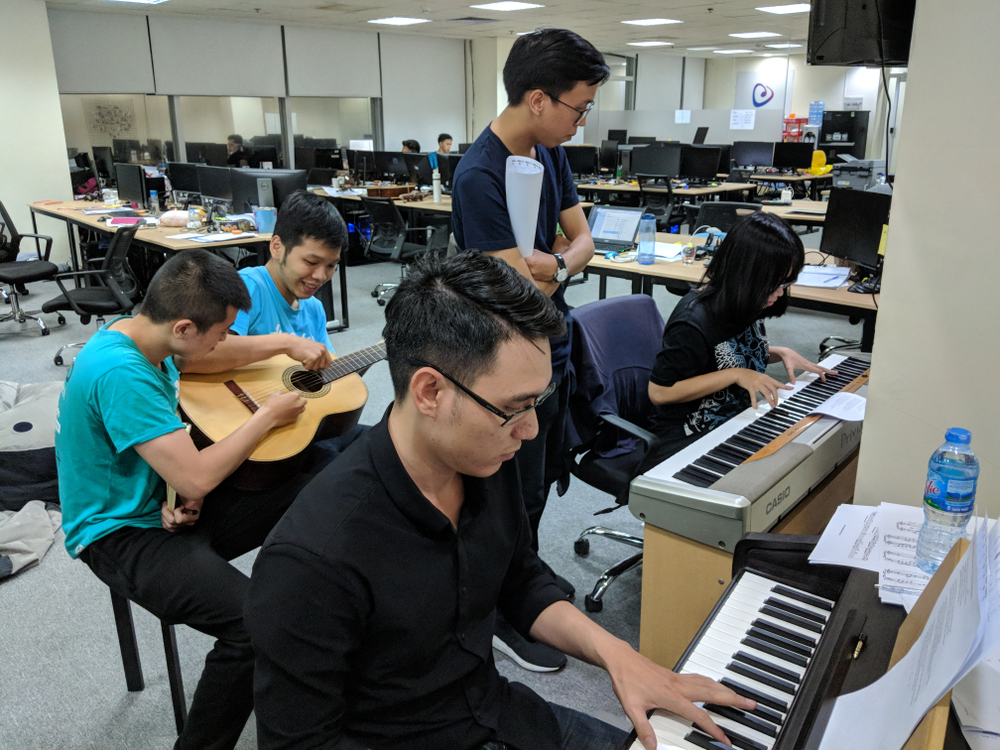The February issue of Forbes Vietnam always garners a lot of attention in the country with its annual 30 Under 30 roster. This year, one name stood out: Nguyen Tuan Cuong, co-founder of Amanotes.
Unlike some of the stars highlighted by Forbes, Cuong and his company have stayed out of the limelight until now.
Amanotes was founded in 2015 by Cuong alongside his CEO and co-founder Vo Tuan Binh. It is now a fast-growing music tech startup based in Ho Chi Minh City, known chiefly among players of hyper casual mobile music games.
Even though the company is low-key, in 2019, App Annie ranked it as one of the top 20 publishers of mobile apps across all categories, alongside tech giants Facebook and ByteDance. SensorTower also placed Amanotes among the top 20 app developers in the world, with the highest number of downloads in 2019.
Its flagship product, Magic Tiles 3, simulates piano-, guitar-, drum-playing set to popular songs. It has been downloaded 275 million times since launching in 2016.
Meeting of minds
In 2012, the two co-founders met for the first time through a post in Launch, an informal Facebook group for everything related to Vietnam’s tech and entrepreneurship network.
Cuong, then a recent graduate of Foreign Trade University, was looking for a job at a startup. Binh previously founded a music game startup called MusicKing, but it went belly up in 2009. Having played the piano, Vietnamese bamboo flute, and guitar, but also coming from a technical background, Binh wanted to embark on a new project that combines music and technology.
The two hit it off.
Cuong was drawn to the vision of building a startup that focuses on interactive music games. The two co-founders started doing research and exploring new concepts.
During the company’s early days, Amanotes was primarily self-funded. The team held off the process of seeking external funding by maintaining a small revenue stream from building websites for other Vietnamese companies.
The magical success of Magic Tiles 3
Magic Tiles 3 was inspired by the success of Piano Tiles, released in 2014 and developed by Chinese creator Hu Wen Zeng. Cuong recalls that there Hu’s game was so popular that many other developers cloned his game and released them with tweaks of their own.
The team at Amanotes like the format of Piano Tiles, but saw an opportunity to build something that was different.
“We want to enable users, even those without any musical background, to play a full composition,” Cuong said. “Therefore, we focus on making the music come as alive as possible.”
Cuong said Amanotes decided very early on to target a small niche—hyper casual mobile music games, meaning games that required just one or two actions from players.
According to Cuong, developers in this corner have to deal with the high cost of acquiring licenses for the songs they want to use in their games, as well as marketing costs to get their name out in markets where most players are already bombarded with countless mobile games.
The startup made the financial plunge and invested in licenses for songs. The combination of high-quality music and technology that ensures realistic musical interactions was key to putting Magic Tiles 3 on the map.
Cuong said that Amanotes’ success was rooted in allowing users to experience entire songs instead of looped melodies or monophonic sounds.
Launched in 2016, Magic Tiles 3 was two years in the making, and opened the door for Amanotes to become a major (but understated) player in mobile game publishing. The company accomplished this even though it hadn’t spent much on marketing in the past.
“Everyone can music”
“Our motto is ‘Everyone can music.’ And you can see that music here is a verb, not a noun,” Cuong said during a chat with KrASIA in Ho Chi Minh City. “Most people just like the music, listen to the music, but we want to enable them to interact with the music.”
After making the cut for Forbes’ 30 Under 30 in Vietnam, the 29-year-old has become the face of Amanotes. Having graduated with a master’s degree in innovation and entrepreneurship from the University of Amsterdam, he’s now the company’s chief product officer, overseeing product development and strategies for a series of hit games that have been downloaded more than 700 million times by users across the world.

Amanotes doesn’t disclose its financial details, but Cuong said its revenue is generated from advertising and in-app purchases. Amanotes also has profit-sharing agreements with indie developers that have published their games on Amanotes’ platform.
Global ambitions
The Singapore-registered startup now has 140 team members drawing from 10 nationalities working in Ho Chi Minh City. Amanotes has another office in Singapore, and has plans to soon open one in the United States, where a large chunk of its users are.
The company recently hired Bryan Teo as its chief operating officer, whose previous roles include CEO of online marketplaces Cho Tot and 701Search, both of which were recently acquired by Carousell.

Cuong said that Amanotes’ long-term plan doesn’t only include building new apps. The company will develop a complete music ecosystem for publishers, developers, singers, players, and people learning how to play music, and release it as a tool for other indie developers.
At the moment, Amanotes is an outlier in the startup community in the sense that it has not received any institutional funding since its establishment in 2015. “But we’re looking into that right now. Our goal is to have the funds to acquire other startups that can advance our ‘Everyone can music’ vision to the next level,” Cuong said.
This article is part of KrASIA’s “Startup Stories” series, where the writers of KrASIA speak with founders of tech companies in South and Southeast Asia.
